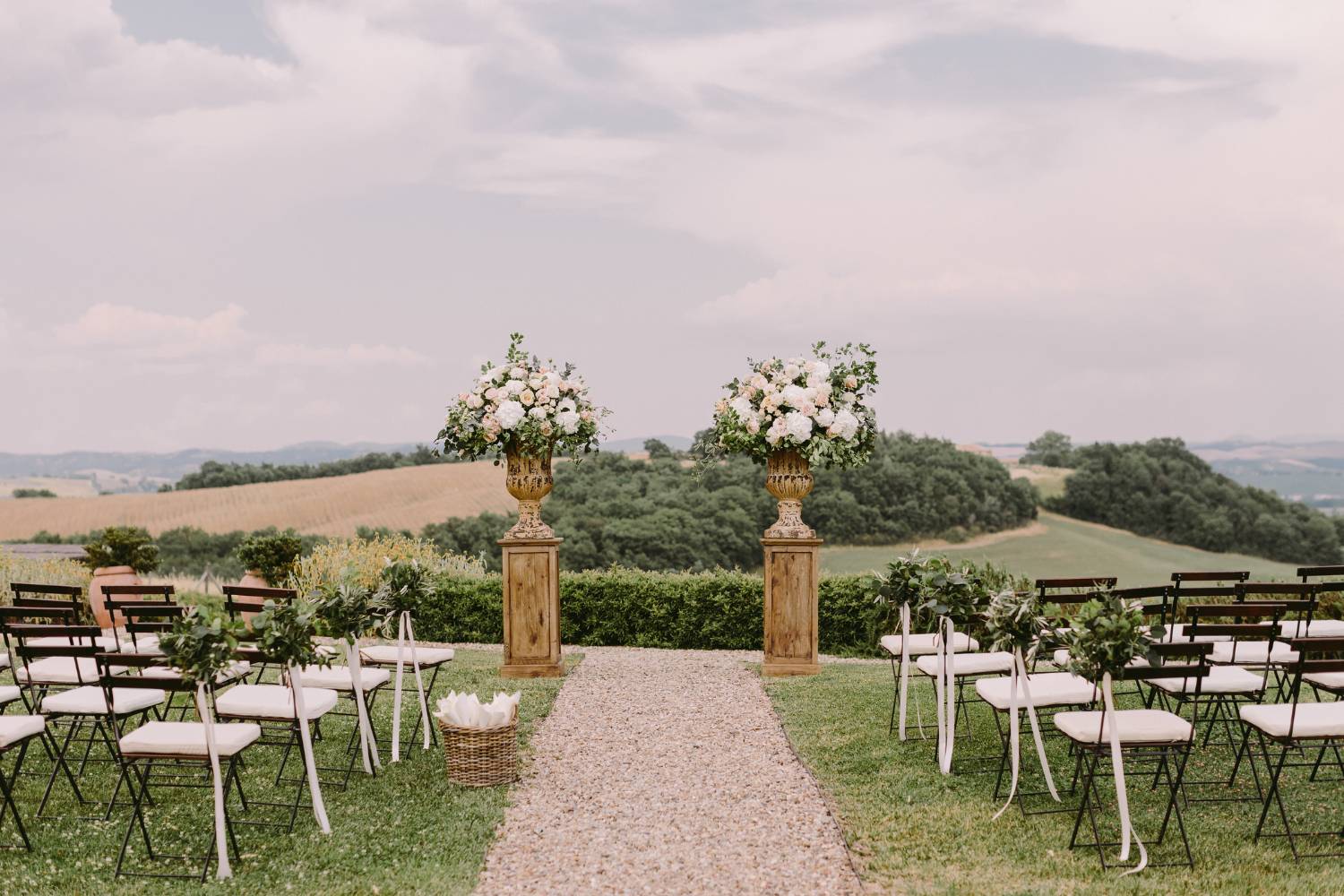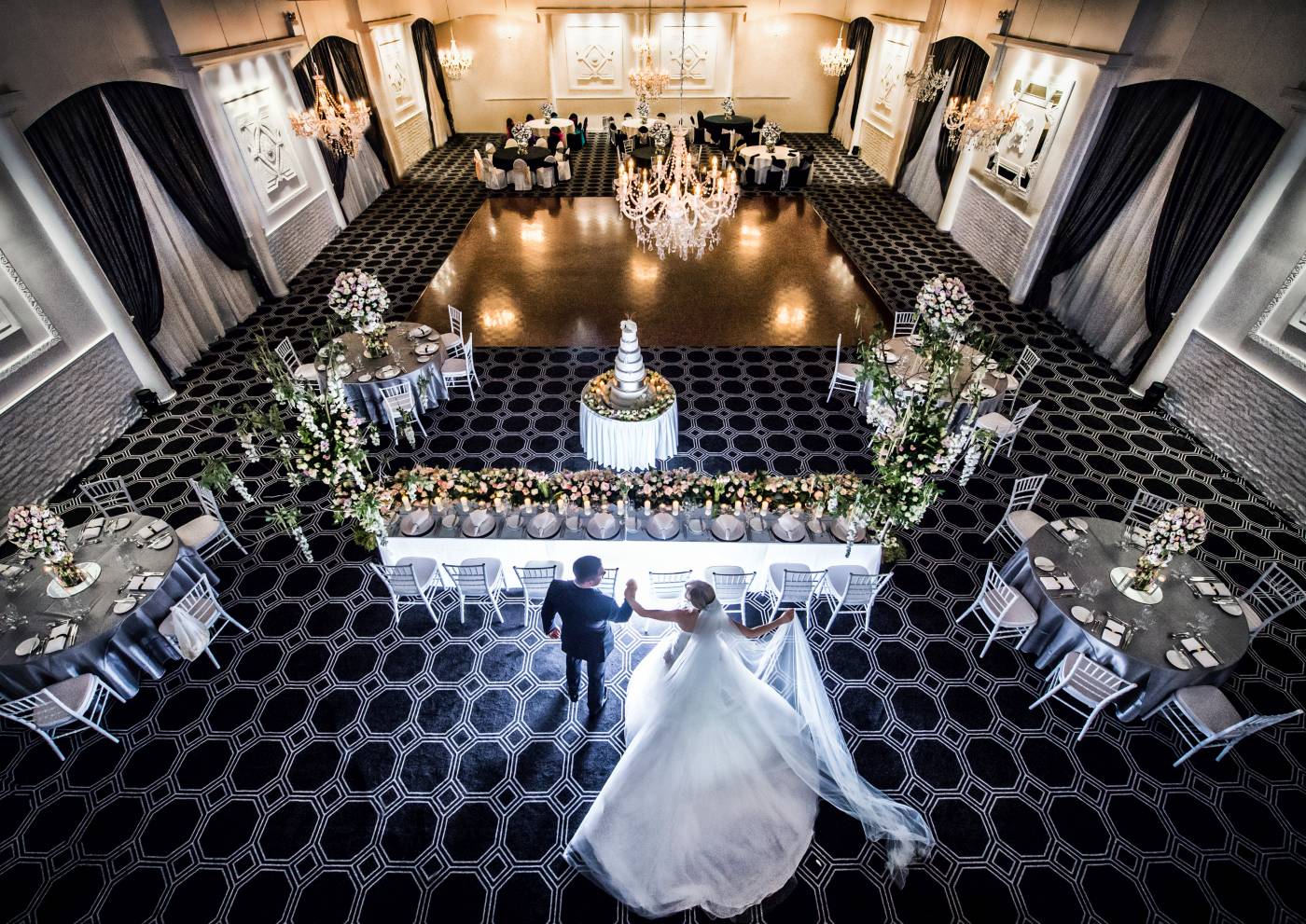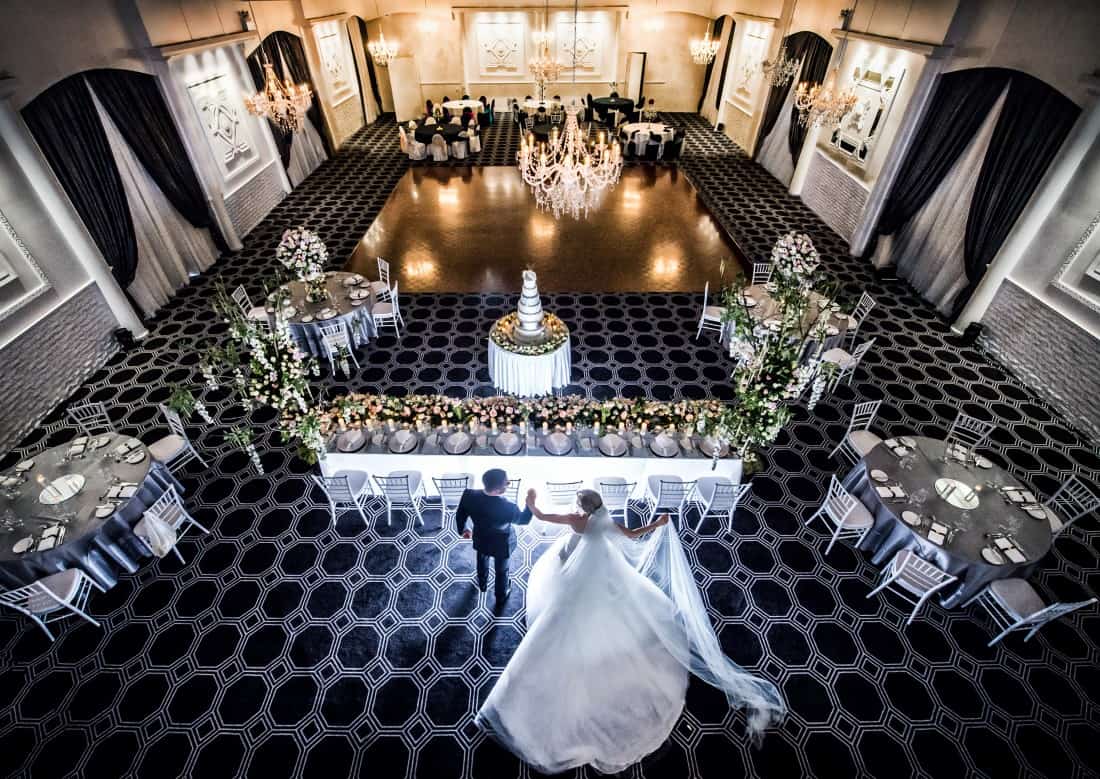Planning a wedding is no small feat. From finding the perfect venue to choosing your dream dress, it’s a whirlwind of decisions that can leave you feeling overwhelmed. And then, of course, there’s the ever-looming question: When should we get married?
While many couples gravitate towards the busy peak wedding season, choosing to marry during the off-season can offer a refreshing twist on the traditional wedding experience. You’ll not only enjoy more affordable prices but also have access to vendors and venues that might be out of reach during the crowded summer months. Plus, there’s something magical about a wedding that takes place outside the typical timeframe — it makes your celebration feel all the more special.
Having been through the wedding planning process myself, and now working as a wedding expert, I can say with certainty: the off-season for weddings is a hidden gem. In fact, when my partner and I got married at Vogue Ballroom in 2017, we chose a winter date—and let me tell you, it was one of the best decisions we made. Fewer crowds, lower costs, and unique wedding opportunities that wouldn’t have been possible in the peak season. Trust me, the off-season might just be the secret ingredient to your dream wedding.
What is an Off-Season Wedding?
When you’re knee-deep in wedding planning, there’s one big decision that can set the tone for everything else: the date. Many couples go for peak wedding season, which usually spans from spring through to early autumn, but what about opting for an off-season wedding? The truth is, the off-season can offer incredible benefits that might make it the perfect time for your dream wedding.
So, what does “off-season” really mean? Simply put, an off-season wedding refers to holding your big day during months or times when fewer couples are tying the knot. Typically, these months are winter—think June to August in Melbourne—but it can also stretch to November or even early December, depending on how popular certain dates are. It can even include certain weekdays, like a Monday to Thursday, when venues are typically quieter.
Let me share a little personal story here. When I got married at Vogue Ballroom in 2017, we chose late June, right in the heart of Melbourne’s winter. At first, I’ll admit, I was nervous about the cooler weather. But it turned out to be a blessing in disguise. There was no scrambling for the best vendors or battling other couples for the same venue dates. We had the pick of everything—our photographer, florist, and even a stunning winter-themed venue that set the perfect mood for our intimate ceremony. The off-season opened up so many options that we didn’t even realise were possible in the peak season.
In Australia, the off-season wedding months often fall between May and September. But depending on your location, and how popular your venue is, the months you consider might vary. Some coastal venues, for instance, are busier during the summer, while others near national parks or city centres might find winter months much quieter.
The off-season isn’t just about the weather; it’s about timing. When fewer weddings are happening, there’s less demand for key venues and suppliers. This means you can often negotiate better deals and book with more flexibility. Less competition can make all the difference in securing your dream venue or vendors—something I witnessed first-hand in my own wedding planning process.
Wedding Off-Season Months: What You Need to Know
So, what exactly are the wedding off-season months in Australia?
- Winter Months: June, July, August – This is the classic off-season for weddings in Melbourne, Sydney, and many other parts of Australia. The cooler weather often keeps people indoors, so if you’re not afraid of a little chill, winter can offer great flexibility with your venue and vendors. Imagine your guests snuggled up inside with hot cocoa, fairy lights, and that intimate winter vibe. It could be a beautiful, unforgettable scene.
- November and Early December – While this is technically the start of the holiday season, many couples overlook this time, thinking it’s too close to Christmas. In reality, November can be the perfect off-season window to book venues and vendors before the holiday rush. The weather is often still mild, making it an excellent option for both indoor and outdoor weddings.
What about the summer months? While traditionally considered “peak season,” summer can be a mixed bag. Some couples prefer to avoid the extreme heat, especially in places like Queensland or even Melbourne, where high temperatures in January and February make it tough for outdoor ceremonies. So, some couples opt to hold their weddings just outside the traditional busy months.
I know a couple who chose February, during the heat of summer, but their venue was tucked in a leafy part of Melbourne with plenty of shade. They made sure their ceremony was indoors, so their guests were comfortable, and the reception was outdoors on a balmy evening—perfect!
Choosing your off-season wedding month depends on your preferences and where you’re located. The key is to be strategic about your timing, so you can take advantage of off-season benefits without missing out on the weather you want.
Why Choose an Off-Season Wedding?
When you start thinking about the perks of an off-season wedding, it’s easy to get excited about the possibilities. It’s not just about saving money—although that’s certainly a big draw! There’s a long list of reasons why choosing an off-season date for your wedding could turn out to be one of your best decisions.
Let me tell you, from my own experience and seeing it with countless couples, an off-season wedding offers a lot of hidden gems. Here’s why:
The Benefits of an Off-Season Wedding
1. Lower Costs and Discounts
The most obvious and arguably most attractive benefit of an off-season wedding is the cost savings. Let’s face it: weddings can get expensive, especially if you’re looking at popular venues or peak wedding dates. But when you opt for an off-season wedding, you’ll often find that venues and vendors are much more willing to negotiate prices to fill their calendars during slower months.
I remember the thrill of getting a 30% discount on our venue when we chose a winter date. It wasn’t just the venue that was offering discounts either—our photographer was also available at a lower rate because his schedule was less packed. Those savings added up quickly, and we were able to invest in some things we hadn’t originally budgeted for, like an extra special dessert table for our guests. I’ve seen this happen for many couples too. With some venues offering 50% off, there’s a chance to stretch your budget without compromising on the quality of your day.
2. Greater Availability and Flexibility
Another huge advantage of choosing an off-season wedding is availability. When you marry during the peak season, you’re fighting for your choice of vendors, venues, and dates. You might end up settling for a less-than-ideal time just because your dream location is already booked.
Not so during the off-season. In my experience, couples who opt for an off-season date can have their pick of venues and often get more flexibility with the time and day of their ceremony. Want a Saturday afternoon ceremony in December? You’ve got it. Need a specific florist who’s usually booked solid in peak season? They’re likely available for your date. The choices are yours when demand is lower.
For one couple I worked with, they were able to book the Vogue Ballroom for a winter wedding without the stress of competing with other couples. They got the date they wanted, a reception area they loved, and all the vendors they had their eye on—all because they chose a less crowded month.
3. More Personalized Vendor Attention
Another upside of off-season weddings is that you get more personalized attention from your vendors. When you choose an off-season wedding, vendors aren’t juggling multiple weddings on the same day or dealing with the stress of a packed calendar. This means they have more time to dedicate to your event, giving you the best experience possible.
Take florists, for example. In the off-season, I’ve seen them work with couples on truly bespoke arrangements because they’re not stretched thin with back-to-back weddings. Same goes for wedding planners, photographers, and even caterers. Your wedding isn’t just another event on their calendar; it’s a priority.
4. Increased Guest Attendance
One of the common worries couples have when planning a wedding is whether their loved ones can attend. With so many weddings happening in peak season, it’s easy for your date to clash with someone else’s big day or with family holidays.
Off-season weddings help solve this problem. In winter or during other off-peak months, there’s often less competition for your guests’ time. You’ll find that friends and family are more available, and it’s easier for people to clear their schedules. Additionally, travel can be cheaper during the off-season, meaning that guests who might otherwise struggle with the cost of attending a wedding could find it more affordable.
For example, when my partner and I got married, a lot of our overseas friends and family were able to attend because flights were less expensive during the winter months. We even had a few guests who took advantage of off-season rates for hotels and accommodations, which helped make the event more accessible for everyone.
5. Unique Atmosphere and Themes
Let’s talk about the atmosphere of your wedding day. The off-season allows you to embrace unique themes that you wouldn’t have been able to pull off in peak season. For example, winter weddings can take on a romantic, cosy vibe, with fairy lights, lush throws, and seasonal food that creates a warm, inviting atmosphere.
One couple I worked with took advantage of the winter season to hold a stunning rustic-themed wedding. They decorated with rich jewel tones, velvet drapery, and lit the entire venue with candles for a romantic, intimate feel. The wedding photos, set against a backdrop of Melbourne’s winter chill, were nothing short of magical. The natural scenery of the season made their wedding one-of-a-kind.
Fall weddings are another example of this. Imagine the stunning backdrops of autumn leaves or golden sunsets, which are perfect for a rustic or vintage-style celebration. These off-season elements help your wedding stand out, creating memories your guests won’t forget.
6. Less Humidity and Rain
While summer weddings are often marred by humidity or rain, off-season weddings can offer more comfortable weather. For example, Melbourne winters tend to be less humid than our summer months, which can be a big plus for guests and the bridal party. Nobody likes frizzy hair or sweating through your wedding vows!
I remember a couple who were getting married in July had no issues with humidity or unexpected rain showers. Their photos came out beautifully, and they were able to plan an outdoor reception in a garden space without worrying about the weather turning on them.
As you can see, there’s no shortage of off-season wedding benefits. From lower costs to personalized vendor attention and unique seasonal themes, choosing an off-season wedding might just give you everything you’ve dreamed of and more.
I can’t stress enough how important it is to take these advantages into consideration as you plan your big day. The off-season allows you to not only save money but also craft an event that’s tailored to your vision—whether that’s a cosy winter wedding or a crisp autumn celebration. It’s about making the most of the quieter months and creating a day that’s truly unforgettable.




